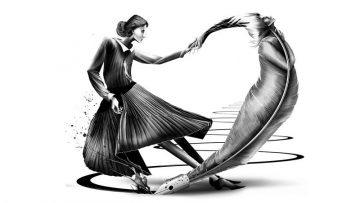Francesca Wade at the TLS
 In her 1931 essay “Professions for Women”, Woolf recalled that thrill of transforming from “a girl in a bedroom with a pen in her hand” to “a professional woman”, her opinions solicited and rewarded by wages she could spend, once rent and bills were covered, on “an extravagant little table” or a “long coveted & resisted coal scuttle” (money, she wrote in A Room of One’s Own, “dignifies what is frivolous if unpaid for”). But the sense of independence afforded by this work was not purely, or even primarily, financial. When she first sat down to write a damning review of a book by a respected gentleman, Woolf was haunted by a phantom voice urging her not to criticize but to charm and flatter, to speak in the language traditionally deemed womanly. She named this spectre the “Angel in the House”, after Coventry Patmore’s poem about the cloying, self-sacrificing ideal of Victorian womanhood; her imagined admonishment – “Never let anybody guess that you have a mind of your own” – nearly “plucked the heart out of my writing”. Conquering the urge to submit to that voice, Woolf concluded, was a prerequisite not only for writing, but for freedom in all aspects of life. The TLS’s affirmation helped Woolf to unmake assumptions of how women should think and behave, and find a new language in which to express herself, ignoring the insistent reminder that there were things “which it was unfitting for her as a woman to say”. Soon after her first reviews were published, seeking respite from dull commissions (“a nondescript book like this which really suggests nothing good or bad, is damned hard work”), she began on the novel that would become her debut, The Voyage Out. Virginia Woolf was launched.
In her 1931 essay “Professions for Women”, Woolf recalled that thrill of transforming from “a girl in a bedroom with a pen in her hand” to “a professional woman”, her opinions solicited and rewarded by wages she could spend, once rent and bills were covered, on “an extravagant little table” or a “long coveted & resisted coal scuttle” (money, she wrote in A Room of One’s Own, “dignifies what is frivolous if unpaid for”). But the sense of independence afforded by this work was not purely, or even primarily, financial. When she first sat down to write a damning review of a book by a respected gentleman, Woolf was haunted by a phantom voice urging her not to criticize but to charm and flatter, to speak in the language traditionally deemed womanly. She named this spectre the “Angel in the House”, after Coventry Patmore’s poem about the cloying, self-sacrificing ideal of Victorian womanhood; her imagined admonishment – “Never let anybody guess that you have a mind of your own” – nearly “plucked the heart out of my writing”. Conquering the urge to submit to that voice, Woolf concluded, was a prerequisite not only for writing, but for freedom in all aspects of life. The TLS’s affirmation helped Woolf to unmake assumptions of how women should think and behave, and find a new language in which to express herself, ignoring the insistent reminder that there were things “which it was unfitting for her as a woman to say”. Soon after her first reviews were published, seeking respite from dull commissions (“a nondescript book like this which really suggests nothing good or bad, is damned hard work”), she began on the novel that would become her debut, The Voyage Out. Virginia Woolf was launched.
more here.
